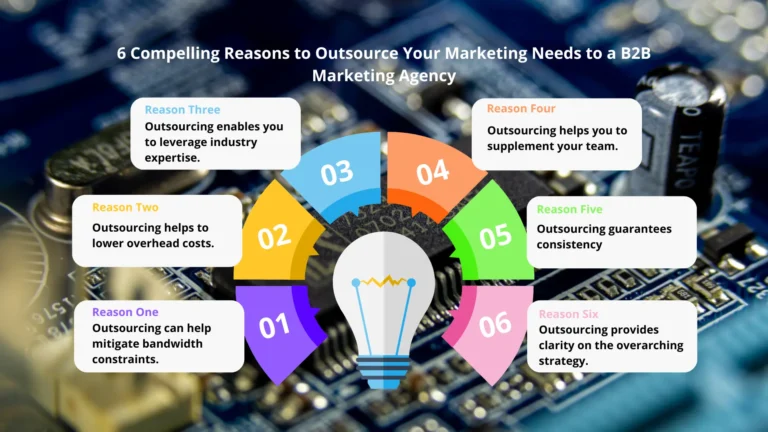
Digital marketing refers to using various digital channels, such as search engines, social media, email, and websites, to promote a product or service. The goal of digital marketing is to reach a target audience and persuade them to take a desired action, such as making a purchase or signing up for a service. Digital marketing strategies may include search engine optimization (SEO), pay-per-click advertising (PPC), content marketing, influencer marketing, email marketing, and more. The use of analytics and tracking technology is also a key aspect of digital marketing, as it allows marketers to measure the effectiveness of their campaigns and make data-driven decisions.
How Digital Marketing Works?
Digital marketing uses various online channels to reach potential customers and promote a product or service. Here are a few examples of how digital marketing works:
- Search Engine Optimization (SEO): This involves optimizing a website’s content and structure to improve its ranking on search engines like Google. A website is more likely to be visited by potential customers by appearing higher in search results.
- Pay-Per-Click Advertising (PPC): This involves placing ads on search engines or other websites and only paying when someone clicks on the ad. This can be an effective way to drive targeted traffic to a website.
- Social Media Marketing: This involves using platforms like Facebook, Twitter, and Instagram to promote a brand, product, or service. Social media marketing can include creating and sharing content, running paid advertising campaigns, and engaging with followers.
- Content Marketing: This involves creating and sharing valuable content, such as blog posts, videos, and infographics, to attract and engage potential customers. The goal is to provide valuable information that will help establish a brand as an authority in its industry.
- Email Marketing: This involves sending promotional emails to a list of subscribers. Email marketing can be used to promote sales, share news, or provide valuable information.
- Affiliate Marketing: This type of marketing is based on a performance-based model, where an individual or a company promotes a product or service, and the promoter is compensated for each sale made through their unique referral link or code.
All these methodologies and channels have different metrics, audiences, and impact depending on the type of business, product, and audience.
The key to successful digital marketing is to identify the channels that will be most effective for reaching a particular target audience and then use those channels to deliver a consistent, compelling message that will encourage the desired action.
Types of Digital Marketing Channels
Many digital marketing channels can be used to reach potential customers. Here are a few examples:
- Search Engine Marketing (SEM): This includes both search engine optimization (SEO) and pay-per-click advertising (PPC). SEO involves optimizing a website’s content and structure to improve its ranking on search engines like Google, while PPC involves placing ads on search engines and only paying when someone clicks on the ad.
- Social Media Marketing: This includes using platforms like Facebook, Twitter, Instagram, LinkedIn, and other social media platforms to promote a brand, product, or service. Social media marketing can include creating and sharing content, running paid advertising campaigns, and engaging with followers.
- Content Marketing: This includes creating and sharing valuable content, such as blog posts, videos, infographics, and e-books, to attract and engage potential customers. The goal is to provide valuable information that will help establish a brand as an authority in its industry.
- Email Marketing: This includes sending promotional emails to a list of subscribers. Email marketing can be used to promote sales, share news, or provide valuable information.
- Influencer Marketing: This includes partnering with well-known individuals in a particular industry or niche to promote a product or service. Influencers can be celebrities, social media personalities, or industry experts.
- Affiliate Marketing: This type of marketing is based on a performance-based model, where an individual or a company promotes a product or service, and the promoter is compensated for each sale made through their unique referral link or code.
- Mobile Marketing: This includes reaching customers through mobile devices like smartphones and tablets. This can include SMS messaging, mobile apps, and mobile advertising.
- Referral Marketing: This includes encouraging satisfied customers to refer friends and family to a business or product.
- Native Advertising: This refers to using paid advertising that matches the form and function of the platform on which it appears.
All these channels can be used in different ways and combinations depending on the type of business, product, audience, and marketing goals.

Key Performance Indicators (KPIs) in Digital Marketing
Key Performance Indicators (KPIs) are metrics that are used to measure the success of a digital marketing campaign. Different KPIs are relevant for different types of campaigns and goals, but some common examples include the following:
- Traffic: This measures the number of visitors to a website. It can be broken down further into metrics like unique visitors, page views, and bounce rate.
- Conversion Rate: This measures the percentage of website visitors who take a desired action, such as making a purchase or signing up for a service.
- Return on Investment (ROI): This measures the financial return on marketing investment. It can be calculated by dividing the revenue generated by the campaign by the cost of the campaign.
- Lead Generation: This measures the number of leads generated by a campaign, such as a contact form submissions or phone calls.
- Brand awareness: This measures the level of brand awareness and brand recall among target audiences.
- Engagement: This measures the level of engagement with a brand, product, or service through likes, shares, comments, and mentions on social media platforms.
- Time on site: This measures the average time visitors spend on a website.
- Click-through Rate (CTR): This measures the percentage of people who click on a link or ad out of the total number of people who see it.
- Cost per acquisition (CPA): This measures the cost of acquiring a new customer through a specific marketing channel.
- Revenue: This measures the financial gain from a specific marketing campaign.
These are just a few examples of KPIs that can be used to measure the success of a digital marketing campaign. The KPIs most relevant for a particular campaign will depend on the campaign’s goals and the type of product or service being promoted.

Digital Marketing Challenges
Digital marketing can be an effective way to reach potential customers, but it also presents certain challenges. Some common challenges of digital marketing include the following:

- Competition: With so many businesses using digital marketing channels, it can be difficult to stand out and attract attention.
- Ad saturation: With so many ads being shown online, it can be hard for any ad to stand out and get noticed.
- Keeping up with the latest trends and changes: Digital marketing is constantly evolving, and it can be difficult for businesses to keep up with the latest trends and changes in platforms and technologies.
- Measuring success: With so many metrics and KPIs to track, it can be hard to determine which ones are most important and how to measure success.
- Data and Privacy concerns: With the increasing amount of data collected, it can be difficult to maintain customer trust and privacy.
- Limited resources: Smaller businesses or start-ups may have limited resources, making it hard to compete with larger businesses in terms of marketing budget.
- High Cost: Paying for ads, staff, and tools can be expensive, and it can be difficult to justify the cost of digital marketing to stakeholders.
- Limited targeting options: With a large amount of audience data, it can be difficult to reach the right audience with the right message.
- Lack of personalization: With a large amount of data available, it can be hard to deliver personalized and relevant messages to the audience.
To overcome these challenges, businesses need to stay informed about the latest trends and changes in digital marketing, measure and analyze their campaigns’ results, and always keep their target audience in mind when creating and executing their marketing strategies.
What Skills are Needed in Digital Marketing?
Digital marketing requires a variety of skills, including both technical and creative abilities. Here are a few examples of skills that are needed in digital marketing:
- Search Engine Optimization (SEO): Knowledge of how search engines work and how to optimize a website’s content and structure to improve its ranking on search engines.
- Pay-Per-Click Advertising (PPC): Understanding how to create and run effective PPC campaigns on platforms like Google Ads and Facebook Ads.
- Content Marketing: Writing skills, the ability to create compelling and engaging content, and knowledge of how to create and distribute content effectively.
- Social Media Marketing: Understanding of how to use social media platforms to promote a brand, product, or service and the ability to create and share engaging content.
- Email Marketing: Knowledge of how to create effective email campaigns and the ability to write compelling subject lines and email copy.
- Web Analytics: Understanding how to use tools like Google Analytics to track website traffic and measure the success of digital marketing campaigns.
- Data Analysis: Understanding how to analyze and use data to make data-driven decisions.
- Graphic Design: Knowledge of how to create visually appealing graphics and other materials for digital marketing campaigns.
- Copywriting: The ability to write persuasive, compelling copy for ads, landing pages, and other marketing materials.
- Project management: The ability to effectively plan and manage digital marketing projects and campaigns.
- Marketing strategy: Understanding of the overall marketing strategy and the ability to develop and execute a comprehensive digital marketing plan.
- Digital tools: Knowledge of tools and software such as Google Analytics, Google AdWords, Hootsuite, Mailchimp, Canva, etc.
These are just a few examples of skills needed in digital marketing, and the specific skills needed will vary depending on the type of digital marketing role and industry. Many skills can be learned through training, education, or on-the-job experience, but staying current and adapting to the ever-changing digital landscape is also important.
The Bottom Line
In summary, digital marketing uses various digital channels to promote a product or service and reach a target audience. It includes a wide range of strategies, including search engine optimization, pay-per-click advertising, social media marketing, content marketing, email marketing, and affiliate marketing. The use of digital marketing channels is constantly evolving, and new opportunities are arising as technology and consumer behavior change. However, staying informed and adapting to the changing landscape is important. To succeed in digital marketing, it’s essential to have various skills, including technical, analytical, and creative abilities. These skills can be acquired through education, training, and on-the-job experience. It’s also important to continuously learn and stay current with digital marketing trends and best practices.






